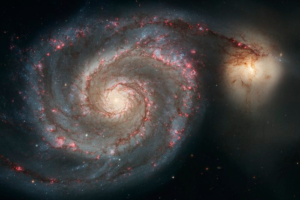 Twice in two days I’ve heard comparisons that link the number of neural connections in the brain to the number of stars in a galaxy. So now I’m imagining myself walking around with a galaxy inside my head.
Twice in two days I’ve heard comparisons that link the number of neural connections in the brain to the number of stars in a galaxy. So now I’m imagining myself walking around with a galaxy inside my head.
When we were kids, we drew on the most up-to-date scientific imagery available to us and wondered, What if every single atom was a solar system and out there on some of the electrons are kids just like us, only really, tiny…
Well now I’ve got this galaxy in my head. No doubt it has solar systems orbiting stars a lot like our sun and planets with conditions amenable to life just like on earth, so it’s not totally unlikely that on one of those planets there would be people just like me, beings with prisms and notebooks who scry my daydreams and write theories of the beginning and the end and the rules of the galaxy in my head.
Would those beings be the same little-little people that lived on the electrons when I was a kid? I’m not sure, but I don’t think so. Their point of view would be different, wouldn’t it? I was riding my bike uphill when I was wondering this, watching dawn spread across the Idaho Palouse. I got distracted before I finished thinking it through.
While I ate breakfast, I read an essay by Marilynne Robinson called “Freedom of Thought.” It’s from her collection When I was a Child I Read Books. I copied down a statement she made about “tedious, fruitless controversy” in which the disagreement is not as important as what she calls “the hardening of agreement, the tacit granting on all sides of assumptions that ought not to be granted on any side.”
For months now, I’ve been reading the kinds of books that scientists write to explain their discipline and its cutting edge ideas in a way that the general public can understand. The big-bang cosmos and quantum theory. Communication, computation, and the brain. I keep getting caught up on the wrong bits and pieces, sentences that make me want to make passive-aggressive mischief at the back of the room. Which isn’t very polite and anyway, who am I to be quibbling with experts, PhDs, and directors of institutes who have made the effort to dumb themselves down enough to speak with me? Without the quibbling, though, the door is open for those tacit assumptions that ought not to be granted.
Is there not an agreement hardened into statements like God doesn’t play dice, or Since we came down from the trees? What extra things do we learn when we hear that our hips weren’t designed for walking upright, or that language is or is not hardwired into our brains?
Do these things matter? I think they do. But it can be lonely to rebel against every tacit assumption that assault you. You end up with nobody to talk to and hardly any words to use. Tiresome is what people will call you.
I can’t picture myself at a party, trying out a conversation opener like, How ‘bout that vocabulary of religion, the way it freights its way into descriptions of science? I think I would have to get a whole new set of friends to pull of something like that. But how could I give up the friends I have? They are the kind of people who might take up the discussion if I were to ask, Do you ever feel like you’re walking around with a galaxy in your head? Then we could work out together the relationship between the kids on the electrons and the kids inhabiting the galaxies in our heads.
Photo credit: NASA, ESA, S. Beckwith (STScI), and The Hubble Heritage Team (STScI/AURA)